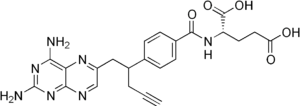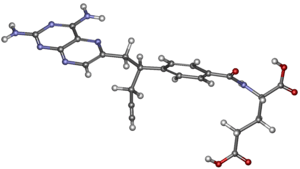Pralatrexate
Pralatrexate (brand name Folotyn) is an anti-cancer therapy.[1] It is the first drug approved as a treatment for patients with relapsed or refractory peripheral T-cell lymphoma, or PTCL[2] — a biologically diverse group of aggressive blood cancers that have a poor prognosis.[2]
 | |
 | |
| Clinical data | |
|---|---|
| Trade names | Folotyn |
| AHFS/Drugs.com | Monograph |
| License data |
|
| Pregnancy category |
|
| Routes of administration | Intravenous |
| ATC code | |
| Legal status | |
| Legal status |
|
| Identifiers | |
| |
| CAS Number | |
| PubChem CID | |
| IUPHAR/BPS | |
| ChemSpider | |
| UNII | |
| ChEBI | |
| ChEMBL | |
| CompTox Dashboard (EPA) | |
| ECHA InfoCard | 100.205.791 |
| Chemical and physical data | |
| Formula | C23H23N7O5 |
| Molar mass | 477.481 g·mol−1 |
| 3D model (JSmol) | |
| |
| |
| | |
Approval
Folotyn was approved by the U.S. Food and Drug Administration (FDA) in September 2009 under the FDA's accelerated approval,[2] which allows for earlier approval of drugs that meet unmet medical needs.[3] Pralatrexate injection is marketed in the U.S. under the name Folotyn by Spectrum Pharmaceuticals.[2]
It was approved as a treatment for peripheral T-cell lymphoma, on the basis of a clinical trial demonstrating the ability to reduce tumor size, but not to prolong life. Some oncologists, patient groups, and insurance companies criticized the cost of $30,000 a month or more, which could reach a total of $126,000 during a course of treatment.[4]
Mechanism
Pralatrexate is an antifolate (a folate analogue metabolic inhibitor) designed to accumulate preferentially in cancer cells.[1] Based on preclinical studies, researchers believe that pralatrexate selectively enters cells expressing reduced folate carrier type 1 (RFC-1), a protein that is overexpressed on certain cancer cells compared to normal cells.[1]
Antifolates, such as pralatrexate, are part of a group of compounds known as antimetabolites with structural similarity to naturally occurring molecules involved in DNA synthesis.[5] Cancer cells mistake antimetabolites for normal metabolites[5] allowing the compound to stop or slow critical enzymes involved in DNA synthesis which then triggers cell death.[1] Because of their primary effect on DNA synthesis, the antimetabolites are most effective against actively dividing cells and are largely cell-cycle phase specific.[5]
Discovery
Research on this class of drugs began in the 1950s at SRI International, where scientists were focused on developing new chemotherapies and antifolates that would be effective against tumor cells.[1]
In the late 1970s, researchers at Memorial Sloan Kettering Cancer Center discovered that cancerous cells take in natural folate through a protein identified as plasma membrane transporter (now referred to as “reduced folate carrier type 1” or “RFC-1”). Further research showed that when normal cells evolve into cancerous cells they often overproduce RFC-1 to ensure they get enough folate.[6]
A subsequent scientific collaboration was ultimately formed among SRI International, Memorial Sloan Kettering Cancer Center, and the Southern Research Institute with the intention of developing an antifolate with greater therapeutic selectivity – an agent that could be more effectively internalized into tumors (transported into the cells through RFC-1) and would be more toxic to cancer cells than normal cells.[6]
This collaboration, supported by the National Cancer Institute,[7] led to the identification of pralatrexate in the mid-1990s. Pralatrexate was later licensed to Allos Therapeutics in 2002 for further development.[8] Allos Therapeutics, Inc. was acquired by Spectrum Pharmaceuticals, Inc. on September 5, 2012. Allos is now a wholly owned subsidiary of Spectrum.[9]
See also
References
- "Archived copy". Archived from the original on 2013-01-17. Retrieved 2010-09-20.CS1 maint: archived copy as title (link), Allos Therapeutics Press Release, “Allos Therapeutics' Pralatrexate Demonstrates Anticancer Activity in Multiple Cancer Cell Lines”.
- , Allos Therapeutics Press Release, “Allos Therapeutics' FOLOTYN(TM) First and Only FDA-Approved Therapy for Relapsed or Refractory Peripheral T-cell Lymphoma”.
- , FDA, “Fast Track, Accelerated Approval and Priority Review”.
- Andrew Pollack (December 4, 2009). "Questioning a Cancer Drug That Costs $30,000 a Month". New York Times. Retrieved 2009-12-05.
The price of the new drug, called Folotyn, is at least triple that of other drugs that critics have said are too expensive for the benefits they offer to patients.
- , Psychiatric Times, “Principles of Oncologic Pharmacotherapy”.
- , Memorial Sloan Kettering Cancer Center Press Release, “FDA Approves Lymphoma Drug Developed at Memorial Sloan Kettering”.
- "Archived copy". Archived from the original on 2010-09-01. Retrieved 2010-09-20.CS1 maint: archived copy as title (link), National Cancer Institute “NCI Cancer Bulletin: The Next Steps in Drug Development at NCI”.
- "FDA Approves Pralatrexate for Treatment of Peripheral T-Cell Lymphoma" (Press release). SRI International. 2009-09-25. Retrieved 2013-07-10.
- Avery, Greg (2012-09-07). "Purchase of Allos Therapeutics is completed". Denver Business Journal. Retrieved 2013-07-10.